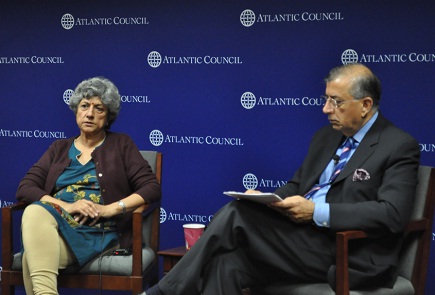
The U.S.’s relationship with India has undergone major transformations in the past decade through evolving leadership, economies, and regional dynamics, in addition to a recognition of shared interests and values between the two countries. The landmark bilateral agreements on trade and nuclear issues, and the expansion of business and trade coupled with strategic dialogues has added a layer of industrial cooperation beyond politics and diplomacy. How will the new administration handle this important relationship, particularly with India and China’s growing relationship and the U.S.’s re-engagement with Pakistan? As the greater South Asia region undergoes significant changes, what role will India play?
On January 30, the Atlantic Council hosted Ambassador Neelam Deo, former Indian diplomat and presently the Co-founder and Director of Gateway House: Indian Council on Global Relations, in conversation with Shuja Nawaz, Director, South Asia Center, the Atlantic Council.
They deliberated on these questions, following which Ambassador Deo spoke about the bilateral and regional implications of the evolving India-U.S. relations.
Ambassador Neelam Deo is the Co-founder and Director of Gateway House: Indian Council on Global Relations. She is the former Indian Ambassador to Denmark and Ivory Coast with concurrent accreditation to several West African countries. She has also served in Indian embassies in Washington D.C., Bangkok and Rome. Her most recent assignment was as Consul General in New York.
Shuja Nawaz is the first and incumbent Director of the South Asia Center at the Atlantic Council. He is a political and strategic analyst, and writes for leading newspapers and websites. He often speaks on current issues before civic groups, think tanks, and on radio and television worldwide. He is the author ofCrossed Swords: Pakistan, its Army, and the Wars Within; FATA: A Most Dangerous Place; Pakistan in the Danger Zone: A Tenuous US-Pakistan Relationship; andLearning by Doing: The Pakistan Army’s experience with Counterinsurgency.
You can read the transcript of the meeting, here, and listen to the meeting, here.
